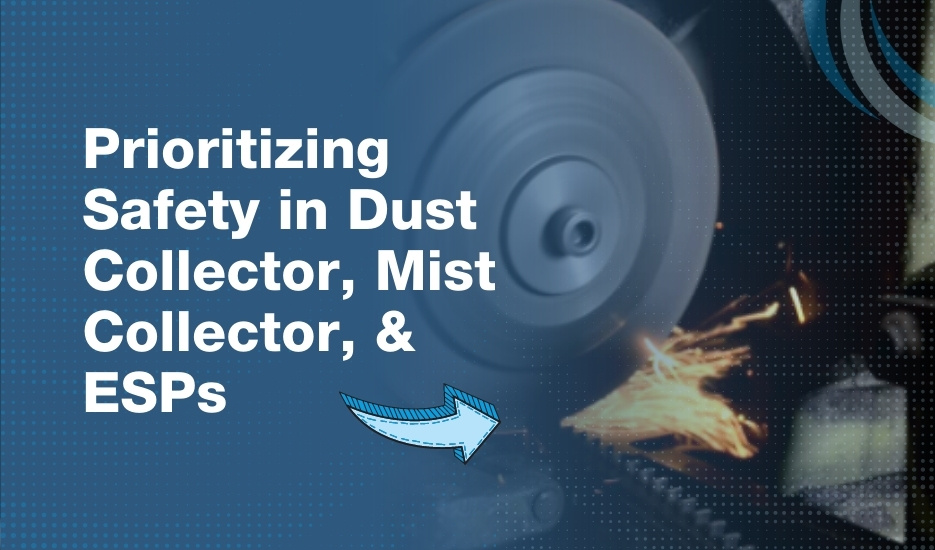When working with dust collectors, mist collectors, and electrostatic precipitators (ESPs), safety must be the most important consideration. These industrial air filtration systems are crucial for maintaining a clean and safe work environment. However, they also pose potential risks if not handled properly. In this blog post, we will delve into the importance of safety measures when using these systems, focusing on protection from fire/explosion, safety essentials during maintenance, interlocks to prevent filter breakage, and safe mounting options and ducting design to prevent accidents or safety incidents.
Protection of filters from fire or explosion
One of the primary safety concerns associated with dust collectors is the risk of fire or explosion. Certain types of dust such as that from aluminium machining, or other combustible particles or flammable liquids, can create hazardous conditions. To mitigate these risks, it is essential to employ suitable safety measures. This includes implementing explosion protection systems, such as explosion vents, flameless venting devices, or Spark arrestors, depending on the specific application and potential hazards. Adequate grounding and bonding should also be ensured to prevent static electricity buildup. Regular maintenance and inspection of these systems, including the cleaning of filters and collection surfaces, can help prevent the accumulation of combustible materials.
Safety Essentials for industrial air filters in maintenance
The industrial air filtration systems must be designed to ensure the safety of personnel.
For instance, the realisation that cleaning of filters in centrifuge type mist collectors could invite lot of unsafe practices often comes much later to personnel on shopfloor. Particularly in the case of centrifuge filters, cleaning presents various safety challenges, including ergonomic issues and potential hazards. Operators may face difficulties in accessing the filter components, direct mounting may require use of laddles for cleaning at unsafe heights, leading to strained body positions and increased risk of accidents on shopfloor. To address these concerns, it is crucial to prioritize ergonomic design in the equipment, ensuring easy access and minimizing repetitive movements.
No matter what is the type of filter that you are using, providing appropriate training on proper lifting techniques and ergonomics can also help mitigate the risk of injuries. Additionally, maintenance activities should be documented, and comprehensive training programs should be in place to educate personnel on safe maintenance practices.
Interlocks to Avoid Filter Breakage due to Choking
In the case of filter-based systems like dust collectors and mist collectors, it is crucial to incorporate interlocks to avoid filter breakage or damage caused by choking. When filters become clogged or overloaded, the pressure differential across them increases, which can lead to excessive back pressure resulting in loss of suction velocity. Interlocks can be employed to monitor pressure differentials and trigger alarms or shutdown mechanisms when the differential pressure exceeds the recommended limit. This helps prevent catastrophic filter failure, minimizing the risk of equipment damage, airborne contamination, and potential safety incidents. Regular monitoring and maintenance of interlock systems are essential to ensure their continued effectiveness of suction, ensuring consistent high efficiency of system combined with system integrity.
Safe Mounting Options and Ducting Designs
Proper mounting and ducting design are critical aspects of ensuring safety when using direct mounted or centralized dust collectors, mist collectors, and ESPs. Secure and stable mounting of the equipment is necessary to prevent vibrations or movements that could compromise performance or lead to accidents. Additionally, ducting systems must be designed with safety in mind, considering factors such as proper airflow, minimizing pressure drops, and avoiding blockages or leakages that could impact system efficiency and safety. Adequate grounding of ductwork should be ensured to mitigate the risk of static electricity buildup. Regular inspection and maintenance of mounting structures and ducting systems are imperative to identify and address any potential safety hazards promptly.
SFS designs filters with safety in mind
SFS is committed to designing industrial air filters with a strong focus on safety on the shop floor. Recognizing the significance of a safe working environment, SFS has integrated several key features into air filtration systems to enhance safety and protect personnel.
SFS understands the importance of ergonomic design to minimize the risk of injuries during filter change. The filters are engineered with accessibility in mind, ensuring that operators can perform filter replacement without straining their bodies or adopting awkward positions or necessitating the use of accessories or postures with potential safety hazard. SFS filters are equipped with sensors and intelligent controls that constantly monitor safety-related parameters. In the event of any abnormal conditions, such as excessive pressure differentials or airflow restrictions, the system activates alerts, notifying operators of potential hazards.
Every industrial environment is unique, SFS offers custom-designed air filtration systems tailored to specific safety requirements. Our team collaborates closely with clients to understand their safety needs and challenges, and then develop innovative solutions that address those specific concerns. By offering customized safety features, SFS enables companies to create a safer working environment that aligns with their specific operations and processes.
By partnering with SFS, companies can enhance workplace safety, ensure better ergonomics and reduce the time to maintenance and repair while achieving total compliance to the internal Health and Safety norms.
Do not hesitate to get in touch with us at cleanair@sfspl.co.in in case you are facing any safety challenges while operating and maintaining industrial air filters.

